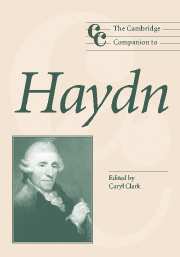Book contents
- Frontmatter
- Part I Haydn in context
- 1 Haydn's career and the idea of the multiple audience
- 2 A letter from the wilderness: revisiting Haydn's Esterházy environments
- 3 Haydn's aesthetics
- 4 First among equals: Haydn and his fellow composers
- Part II Stylistic and interpretive contexts
- Part III Genres
- Part IV Performance and reception
- Index
4 - First among equals: Haydn and his fellow composers
from Part I - Haydn in context
Published online by Cambridge University Press: 28 September 2011
- Frontmatter
- Part I Haydn in context
- 1 Haydn's career and the idea of the multiple audience
- 2 A letter from the wilderness: revisiting Haydn's Esterházy environments
- 3 Haydn's aesthetics
- 4 First among equals: Haydn and his fellow composers
- Part II Stylistic and interpretive contexts
- Part III Genres
- Part IV Performance and reception
- Index
Summary
A striking paradox of Haydn's career is that he traveled very little until the two London visits of the 1790s, yet achieved a degree of international eminence that was unequaled in his time. While composers such as Gluck (1714–87), Hasse (1699–1783) and Mozart (1756–91) traveled extensively they never achieved the same durable, self-perpetuating fame that accrued to Haydn during his lifetime. It was without any poetic hyperbole, therefore, that Griesinger was able to write the following encomium near the beginning of his celebrated biography of the composer.
Haydn was founder of an epoch in musical culture, and the sound of his harmonies, universally understood, did more than all written matter together to promote the honor of German artistic talent in the remotest lands. Haydn's quartets and symphonies, his oratorios and church pieces, please alike on the Danube and on the Thames, on the Seine and the Neva, and they are treasured and admired across the sea as in our own part of the world.
Throughout his biography Griesinger manages to convey the impression that fame was something that happened to Haydn and was not, as in the cases of Gluck, Hasse, Mozart, and others, something that had been actively sought. While this willfully ignores the more opportunistic, ambitious side of Haydn's personality it also conveniently plays into another aspect of the composer's character nurtured by Griesinger: the thoughtful creative figure who was isolated and who achieved greatness alone. On the many years at Eszterháza he was able to quote Haydn directly: “I was set apart from the world, there was nobody in my vicinity to confuse and annoy me in my course, and so I had to be original.”
- Type
- Chapter
- Information
- The Cambridge Companion to Haydn , pp. 45 - 58Publisher: Cambridge University PressPrint publication year: 2005
- 2
- Cited by

